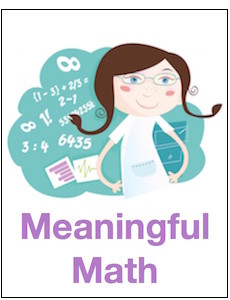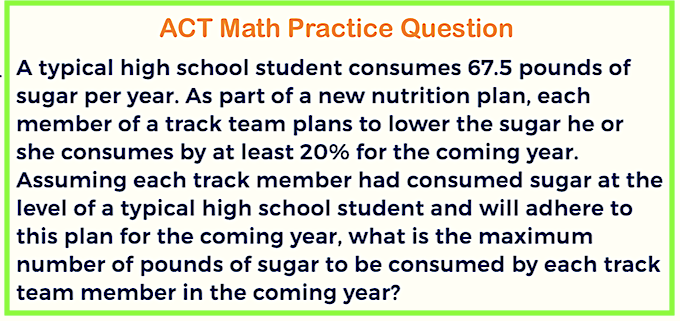Is Test Prep Really Worth All the Effort?
A MiddleWeb Blog
 Whether you teach math in middle or high school, you know about the pressure that standardized test time can bring.
Whether you teach math in middle or high school, you know about the pressure that standardized test time can bring.
I have spent the last eight school days prepping students for the ACT, which serves as part of our high school accountability testing in Alabama.
It might not sound like a lot of time, but it felt like it. I have always gone back and forth on test prep for these big standardized tests. Trying to “cram” information in at the last minute can be harmful. I have found that there’s truth in the old cliche, A little knowledge is a dangerous thing.
I decided to devote the extra class time this year because school has been so disrupted due to Covid-19. But I’m still not convinced this kind of test prep does a lot of good.
Why Spend the Time?
I truly believe the best test prep is good, sound, well-paced instruction throughout the year. However, I also know that a good ACT score is the best bet for some of my students to get to go to college. I realize colleges are moving away from the ACT (and SAT) being the be-all end-all, but it is still important for students. It’s also important for teachers – as a teacher I’m evaluated to some degree based on how my students perform on the math exam. So, prep them I did.
How to Get Students to Buy In?
The first day we started by talking about their goals for the future and what careers they were interested in. Their assignment for the first day was to research what education or training they would need for their selected career(s). We looked at different colleges and found out what ACT score was required for admission and what ACT score would be needed for a scholarship.
This is where we began to have real conversations about the future. Some students have a path planned out that involves a technical degree, such as welding or another trade related field. They will not need to get a certain score on the ACT for their current career path. So we discussed how plans can change and a having a good ACT score will just give you more options. To their credit, most of my students worked hard even if they did not plan on needing the ACT for college, per se.
ACT Basics
Importantly, we talked about some of the logistical issues. Some students did not have an ACT account and did not know how to sign up for the ACT. For first generation college students the process can be very intimidating. Other students didn’t know that you could take the ACT more than once.
My Process

Over the course of several hours I separated them according to some broad categories, such as basic algebra, word problems, probability, and geometry.
I created packets focusing on those categories. Each packet contained about 20 problems, and I gave the students 20 minutes to work on them. Some days I had them submit their answers via a Google Doc, then the next class period we would go over the five problems that were missed by the greatest percentage of students.
Students need variety, so we couldn’t just work on packets every day. One day we played a Kahoot activity that I created to help them remember some of the formulas they would need. I tried to gamify the whole process by giving them points for certain things and promising treats for the winning class.
I also tried to give everyone opportunity to earn points. For example, I gave points to students for remembering to bring their calculator. I also gave points for students who worked up until the bell or who showed extra enthusiasm or who I noticed helping other students.
My Best Engagement Idea

It was nice to hear students “arguing” about the right answer. Some classes liked this better than others. But even my very quiet class still debated about their answers.
Lots of Word Problems!
I spent a lot of time looking at ACT math questions, and what struck me is how many are word problems. In fact, most of the problems are word problems and are several sentences long. I found that students needed a lot of practice decoding the wording and figuring out what the question was asking them to do mathematically.
I am glad that I took the time to look at the ACT in such depth. I hadn’t realized how much of the math section involves reading. That will certainly inform how I structure my classroom tests next year.
Test Prep Strategies
We talked about strategies. One strategy is to mark the same letter for the last 15 questions on the math section of the test right at the start. That way if the student runs out of time, they at least have a chance to get some of the last fifteen questions right (it’s mathematical!). Should they reach the final 15 with time remaining, they can work those problems and change the letter if they need to.
I also suggest that students read the answer choices before they begin working the problem, because that can often help them see where the problem is going. In addition, we spent a lot of time making sure everyone understood how the calculator worked so they would be comfortable on testing day.
So-so Results
I’m not sure it helped. A lot of my students were disappointed after they took the math ACT this week. They said it was “hard” and that there were lots of things on the test that they didn’t recognize.
I think that’s the problem when you try to prep for ACT. There are so many ways to ask a question, and students don’t always realize what is being asked even though they’ve learned the concept. Students have to be prepared to think hard on every question, figure out what is being asked, and be flexible. A tall order.
Their disappointment has been a little demoralizing for me. We worked so hard, and I spent a lot of time behind the scenes preparing for the prep. But I know we tried, and students can take the test again and hopefully some of the work we did will pay off down the road.
Some Bright Side
On the bright side, it was good for me to spend so much time looking at the practice test questions. It reminded me how important it is to ask good questions on my classroom tests and to have students spend time working on “difficult” word problems throughout the year.
In this Covid year it’s been extra challenging to have those activities that require students to really think, but that is something I plan to prioritize next year.
I’m going to have to rethink my plan for 2021-22. Hopefully things will be less chaotic! Please share in the comments how you go about preparing for your standardized tests – in normal years and in the pandemic era.



































